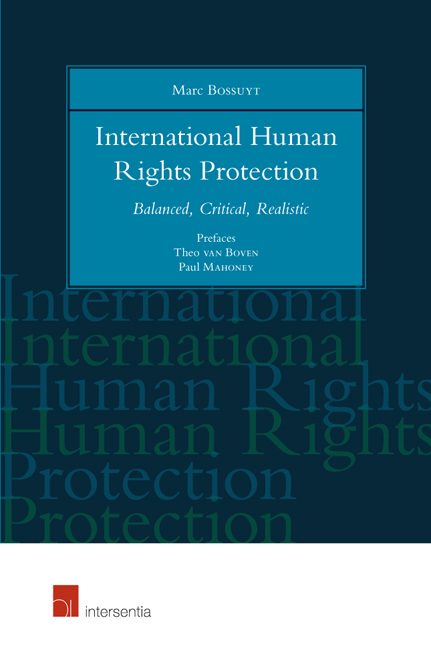Book contents
- Frontmatter
- Dedication
- Preface: A Lifetime of Fidelity and Participation
- Preface: A Penetrating and Salutary Analysis of the European System of Human Rights Protection
- Introduction
- Contents
- Epigraph
- PART ONE International Protection of Human Rights in General
- A The Normative Framework
- Chapter I The Concept of Human Rights
- Chapter II Social Rights: A Specific Category of Human Rights?
- Chapter III The Prohibition of Discrimination
- Chapter IV The Concept of Affirmative Action
- B The Institutional Framework
- PART TWO Specific Human Rights Protection
- Annex: At the Crossroads of Law and Politics
- Bibliographies
- About the Author
Chapter II - Social Rights: A Specific Category of Human Rights?
from A - The Normative Framework
Published online by Cambridge University Press: 25 September 2018
- Frontmatter
- Dedication
- Preface: A Lifetime of Fidelity and Participation
- Preface: A Penetrating and Salutary Analysis of the European System of Human Rights Protection
- Introduction
- Contents
- Epigraph
- PART ONE International Protection of Human Rights in General
- A The Normative Framework
- Chapter I The Concept of Human Rights
- Chapter II Social Rights: A Specific Category of Human Rights?
- Chapter III The Prohibition of Discrimination
- Chapter IV The Concept of Affirmative Action
- B The Institutional Framework
- PART TWO Specific Human Rights Protection
- Annex: At the Crossroads of Law and Politics
- Bibliographies
- About the Author
Summary
Social rights are generally included in other conventions than civil rights because they have different characteristics and because the role of judicial supervision, if any, is different with respect to social rights than with respect to civil rights. First, we will turn to the role of international supervisory organs with respect to social rights before examining the judgments of a prominent national constitutional court (the South African one) in the field of social rights.
A. SOCIAL RIGHTS IN INTERNATIONAL CONVENTIONS
If we speak about human rights in their classical meaning, it is because modern developments have given a different meaning to those rights. Since the Universal Declaration of Human Rights of 10 December 1948, the catalogue of human rights has been expanded with the inclusion of social rights, such as the right to social security, the right to work, the right to health care, the right to education, etc. This expansion has changed the very concept of human rights. Those social rights are not less legitimate or less important than classical civil rights but their legal characteristics are different.
THE DIFFERENT CHARACTERISTICS OF SOCIAL RIGHTS
The existence of different conventions for civil rights and social rights is not the result of a conscious and deliberate choice of lawyers, diplomats and politicians. It is even less the result of an old-fashioned liberalism blind to social needs. Nor does it result from the ignorance of real life or from a regretful negligence. It is the intrinsic difference between those two categories of rights that made a different treatment necessary and unavoidable. Those categories have nothing to do with notions familiar to civil codes or to social legislation. They have an autonomous meaning in the field of human rights. The distinction is based on the importance of the means necessary to ensure their implementation requiring an active role of the State. It is not because a right has a civil or a social connotation that is has different characteristics. It is the other way round: it is appropriate to qualify a right as civil or a social right in function of the characteristics it is considered to have.
- Type
- Chapter
- Information
- International Human Rights ProtectionBalanced, Critical, Realistic, pp. 19 - 32Publisher: IntersentiaPrint publication year: 2016



